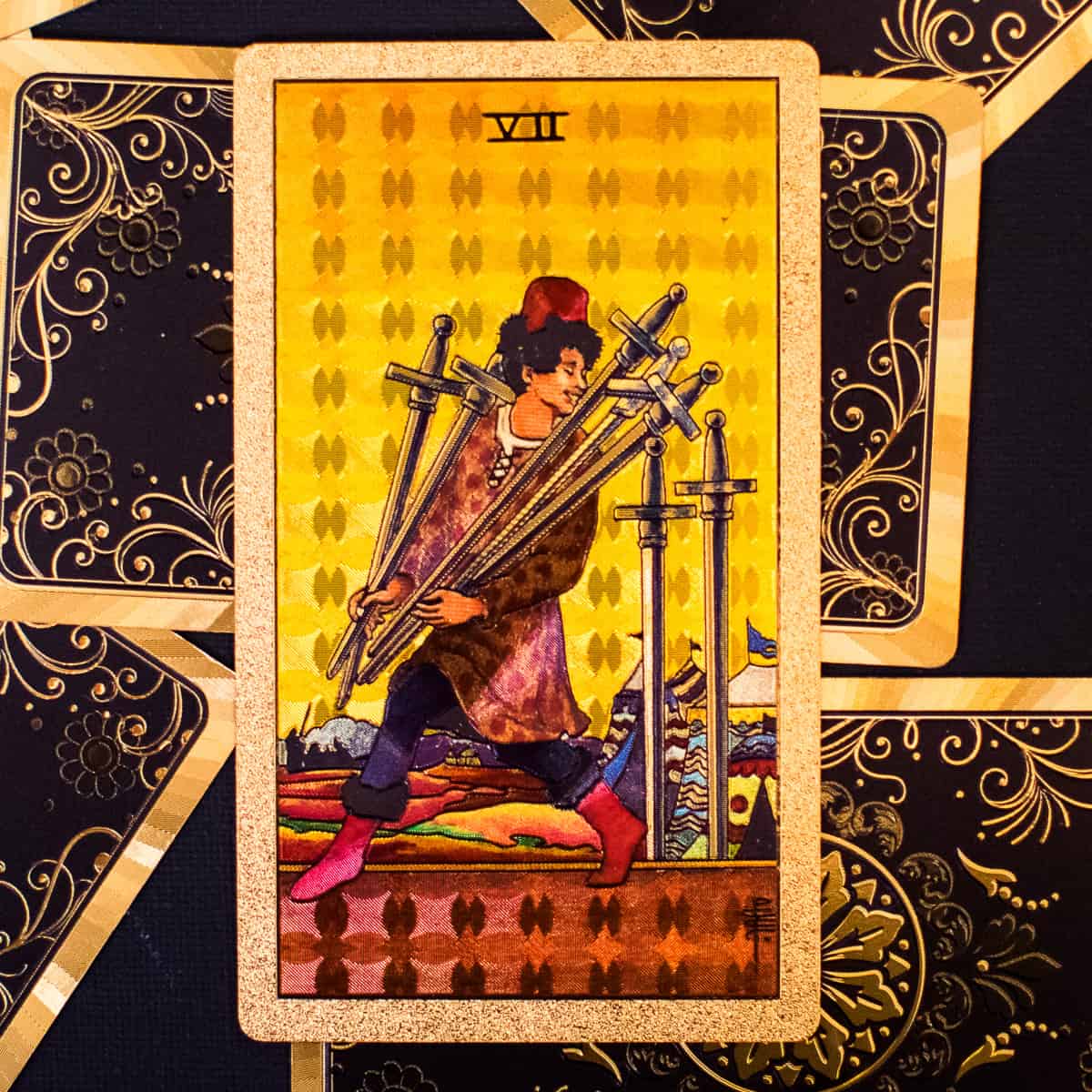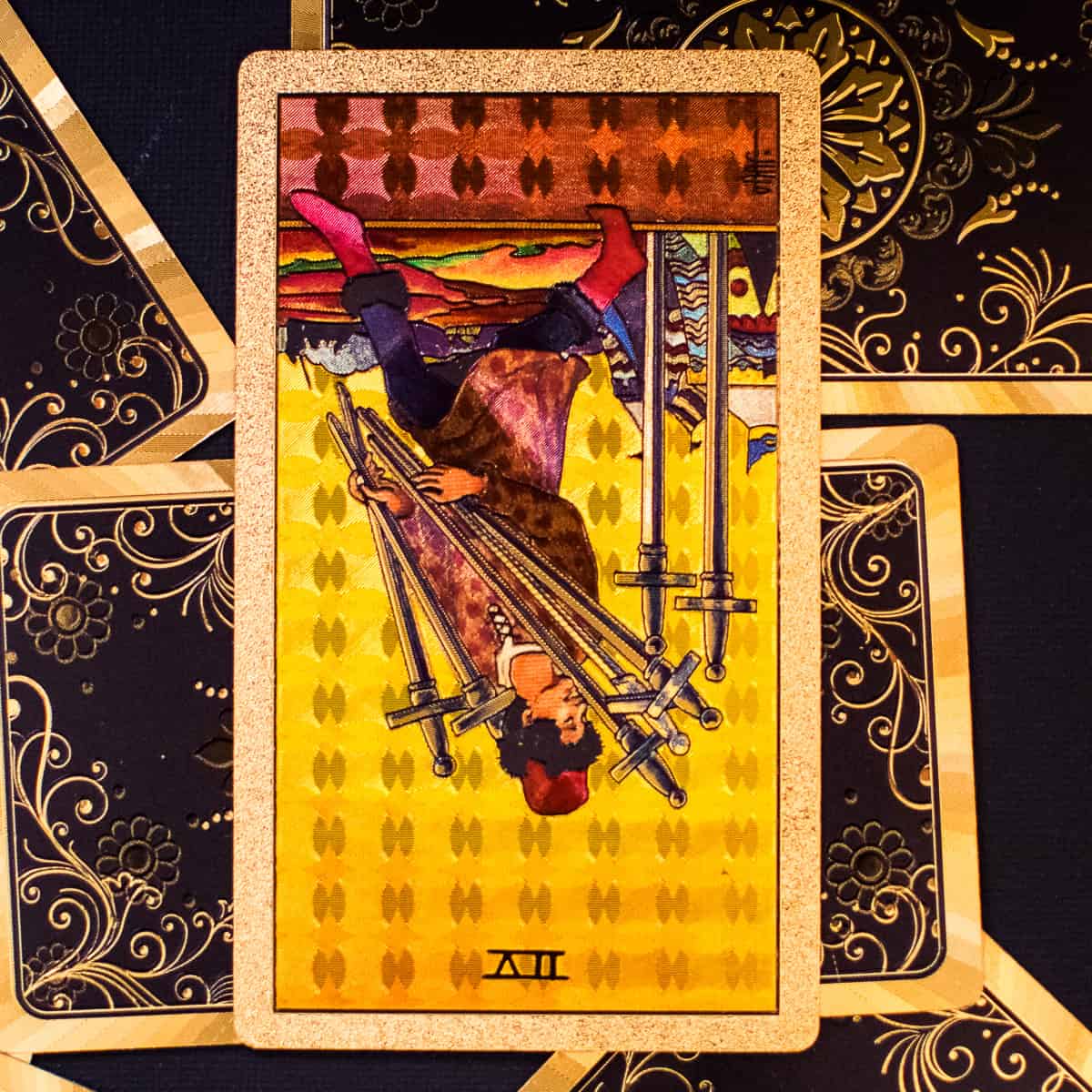The Seven of Swords card in tarot is a card that resembles deceptive energy. This could mean getting away with something or being deceptive in some way.

The Seven of Swords typically represents themes of deception, betrayal, and cunning behavior. It often suggests someone engaging in secretive or dishonest actions, such as sneaking away with stolen goods or manipulating a situation for personal gain.
This card can indicate the need for caution and vigilance, as well as the possibility of being deceived or misled by others. It may also serve as a warning to be honest and upfront in your dealings and to avoid resorting to deceitful tactics to achieve your goals.
Overall, the Seven of Swords reminds us to be mindful of our actions and to consider the consequences of our choices carefully.
Seven of Swords (Reversed)

The Seven of Swords reversed can indicate a few different things. It may suggest that a situation involving deception or betrayal is coming to light, and secrets are being revealed.
It could also signify a desire to come clean or make amends for past dishonesty or manipulation.
Alternatively, it might indicate a shift away from dishonest behavior towards honesty, integrity, and accountability.
However, it's essential to consider the surrounding cards and the specific context of the reading to get a clearer understanding of how the reversed Seven of Swords applies to your situation.
Overall, it often suggests a move towards transparency, honesty, and ethical behavior.
Seven of Swords as Feelings
When the Seven of Swords appears in a reading to represent feelings, it often suggests feelings of deception, betrayal, or sneakiness. The person may feel like they're not being entirely honest or forthcoming, either with themselves or with others. There may be a sense of trying to get away with something or of being wary and cautious in their interactions.
Alternatively, they could be feeling suspicious or wary of others, fearing that they may be deceived or taken advantage of.
Overall, the Seven of Swords as feelings indicates a complex mix of emotions related to dishonesty, betrayal, and deception.
Seven of Swords as Feelings (Reversed)
When the Seven of Swords appears reversed to represent feelings in a tarot reading, it often suggests a desire to move away from feelings of deception, betrayal, or dishonesty.
The individual may be seeking to address any guilt or remorse they feel about past actions or behaviors.
They may be striving for honesty, transparency, and integrity in their interactions with others, or they could be working towards forgiving themselves or others for past indiscretions.
Overall, the reversed Seven of Swords indicates a shift towards authenticity, accountability, and a commitment to ethical behavior in relationships and interactions.
Seven of Swords as a Person
The Seven of Swords as a person typically represents someone who is cunning, deceitful, or manipulative. This individual may be inclined to use dishonest tactics to achieve their goals, such as lying, cheating, or stealing. They may have a knack for being sneaky or evasive, avoiding accountability for their actions.
This person might also be skilled at reading others and exploiting their vulnerabilities for personal gain.
However, it's important to remember that not everyone embodies the negative qualities associated with this card, and individuals can exhibit different traits depending on the context of the reading.
Overall, the Seven of Swords as a person suggests someone who may not always act with integrity or honesty and may need to be approached with caution.
Seven of Swords as a Person (Reversed)
When the Seven of Swords appears reversed to represent a person in a tarot reading, it often suggests an individual who is working to overcome dishonesty, deception, or manipulation.
This person may be striving to be more honest, transparent, and accountable in their actions and interactions with others. They may be actively seeking to address any past indiscretions or deceptive behaviors and are working towards building trust and integrity.
Alternatively, the reversed Seven of Swords may indicate someone who has been a victim of deceit or betrayal in the past and is now focused on healing, forgiveness, and moving forward with greater awareness and discernment.
Overall, the reversed Seven of Swords as a person suggests a transformation towards honesty, integrity, and ethical behavior.
Seven of Swords Yes or No?
The Seven of Swords is often considered a tricky card in a yes or no tarot reading because it signifies deception, dishonesty, or trickery. Therefore, its presence might suggest caution and advise against proceeding with a straightforward "yes" or "no" answer. Instead, it could indicate that there may be hidden factors or information to consider before making a decision.
However, if you're asking a specific question and the Seven of Swords appears upright, it could lean towards a "no" answer, suggesting that there may be deception or dishonesty involved in the situation.
As always, it's crucial to interpret the card in the context of your question and the surrounding cards for a more accurate reading. If the Seven of Swords appears reversed or accompanied by positive cards, it might suggest a more favorable outcome or indicate that any potential deception is being revealed or addressed.
Seven of Swords Sign
The Seven of Swords embodies qualities that can resonate with various signs depending on the interpretation.
The Seven of Swords often reflects themes of deceit, trickery, and evasion. These qualities may align with signs known for their cunning or strategic nature, such as Gemini, known for adaptability and quick thinking, or Scorpio, associated with secrecy and manipulation.
Additionally, the card's symbolism may resonate with air signs like Gemini, Libra, and Aquarius, which are known for their intellect and communication skills, attributes that can sometimes be used for deceptive purposes.
Ultimately, while the Seven of Swords does not represent a particular sign, its qualities and themes can relate to various astrological energies depending on the context of the reading and the individual's circumstances.
Numerology for Seven of Swords
In numerology, the Seven of Swords corresponds to the number 7. The number 7 is often associated with introspection, analysis, and hidden knowledge. When applied to the Seven of Swords, this number suggests a need to delve deeper into a situation, to analyze motives, and to trust one's intuition.
The number 7 also carries spiritual connotations, indicating a quest for truth and understanding beyond the surface level. In the context of the Seven of Swords, this could imply the uncovering of hidden truths or the need to navigate through deception and illusion to find clarity.
Additionally, the number 7 can symbolize challenges and obstacles that prompt growth and self-reflection. Therefore, the Seven of Swords may indicate a time of facing adversity with cunning and strategy, using intellect and analysis to overcome obstacles.
Overall, the numerological significance of the number 7 in the Seven of Swords underscores themes of introspection, analysis, and the quest for truth amidst challenges and deception.
Season for the Seven of Swords
The Seven of Swords does not have a specific season traditionally associated with it in tarot interpretations.
However, its themes of deceit, strategy, and cunning behavior can be relevant at any time of the year, depending on the individual's circumstances.
Seven of Swords Illustration Description
In the Rider-Waite-Smith tarot deck, the illustration of the Seven of Swords depicts a figure stealthily carrying five swords away from a military encampment, leaving two swords behind. The figure appears to be looking back over their shoulder, indicating a sense of caution or secrecy. The scene suggests deceit or theft, as the figure sneaks away with the swords under the cover of darkness.
The background of the card shows a desolate landscape with barren mountains, enhancing the feeling of isolation and stealth. Overall, the illustration conveys the themes of cunning, deception, and strategic planning associated with the Seven of Swords.
